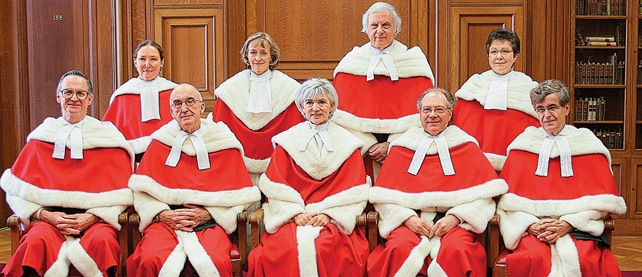By Michael D. Behiels
Are Canada's "Supremes" like the Pope, infallible? Our nine Supreme Justices have closeted themselves away to consider their responses to the three legal questions put to them by the Chretien government in the Quebec Secession Reference case. Will the "Supremes" confirm their 1981 "fatal tilt" toward defining Canada as a loose Confederation? Will they be tempted, as was the case in the 1981 Patriation Reference, to play the dangerous role of political statescraft persons rather than limiting themselves to strict constitutional jurisprudence?
In the Patriation Reference, the "Supremes" created political fallout when they failed to directly address the fundamental legal question of where Canadian sovereignty resides. Does sovereignty rest with Ottawa, with the provinces and Ottawa acting in concert, or with the people of Canada? The Justices strayed from their judicial function when they ruled that the Trudeau Liberal government's Constitutional Resolution entailing patriation with an amending formula was, on the one hand, constitution-ally legal but, on the other hand, unconstitutional in a conventional sense unless it obtained "a substantial degree of provincial consent."
By resorting to what Trudeau denounced as a "blatantly" invented and imposed political convention, the Supreme Court unduly politicized its function as Canada's highest constitutional court. The Supreme Court's "fatal tilt" placed Canadian sovereignty in the hands of Ottawa and a gaggle of self-serving premiers rather than with the Canadian people.
The "Supremes'" meddling in mega-constitutional politics did not have the effect that they planned. Their "maybe" decision did not force Rene Levesque's separatist government to negotiate in good faith. Instead, the mandated Federal-Provincial conference resulted in the self-exclusion of Quebec from the Constitution Act,1982. Quebec lost its much-coveted veto when Trudeau's four-region-based amending formula was replaced with the premiers' equality-of-provinces formulas of 7/50 and unanimity. Finally, the self-serving premiers foisted the Charter's "notwithstanding" clause on Canadians and trashed Trudeau's offer of a referendum to resolve any deadlock over the amending formula. The debacle led directly to the ill-fated 1987 Meech Lake Accord and the 1992 referendum on the Charlottetown Consensus Report.
The Patriation Reference decision was not our "Supremes'" finest hour. Will they drop the ball a second time? The future of the country rests in the balance. Intuition tells me that given the make-up of the Court, with three Francophones from Quebec and one from New Brunswick, and the "fatal tilt" precedent of 1981, the Justices' temptation to play politicians will be far too great to resist.
Canadians do not need any more political meddling by the "Supremes." They should simply decide if Quebec has the legal right under international and/or Canadian law to secede. If they invent another political convention, based on the referenda of 1980 and 1995, to conclude that the "peuple du Quebec" have a democratic, unilateral right to secede, all hell will break loose. Who ultimately determines the conditions under which this narrowly defined democratic right can be exercised? The only proper ruling for the "Supremes" to render, that is if they want to avoid a terminal "fatal tilt," is that it is up to the Canadian people to determine the terms and conditions of any secession.

